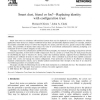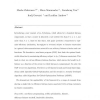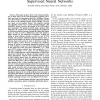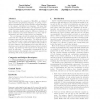380 search results - page 48 / 76 » Functional reactive programming from first principles |
100
Voted
CN
2004
15 years 2 months ago
2004
Smart dust motes are miniature self-contained systems that may be deployed in very large numbers. In military applications these devices are subject to different threats than conv...
106
Voted
COR
2008
15 years 2 months ago
2008
Introducing a new concept of (, )-fairness, which allows for a bounded fairness compromise, so that a source is allocated a rate neither less than 0 1, nor more than 1, times...
165
click to vote
TNN
2010
14 years 9 months ago
2010
This paper proposes three novel training methods, two of them based on the back-propagation approach and a third one based on information theory for Multilayer Perceptron (MLP) bin...
124
click to vote
ICFP
2003
ACM
16 years 2 months ago
2003
ACM
This paper define the semantics of MinAML, an idealized aspect-oriented programming language, by giving a typedirected translation from its user-friendly external language to its ...
121
Voted
FMCAD
2009
Springer
15 years 9 months ago
2009
Springer
—Boolean manipulation and existential quantification of numeric variables from linear arithmetic (LA) formulas is at the core of many program analysis and software model checkin...




